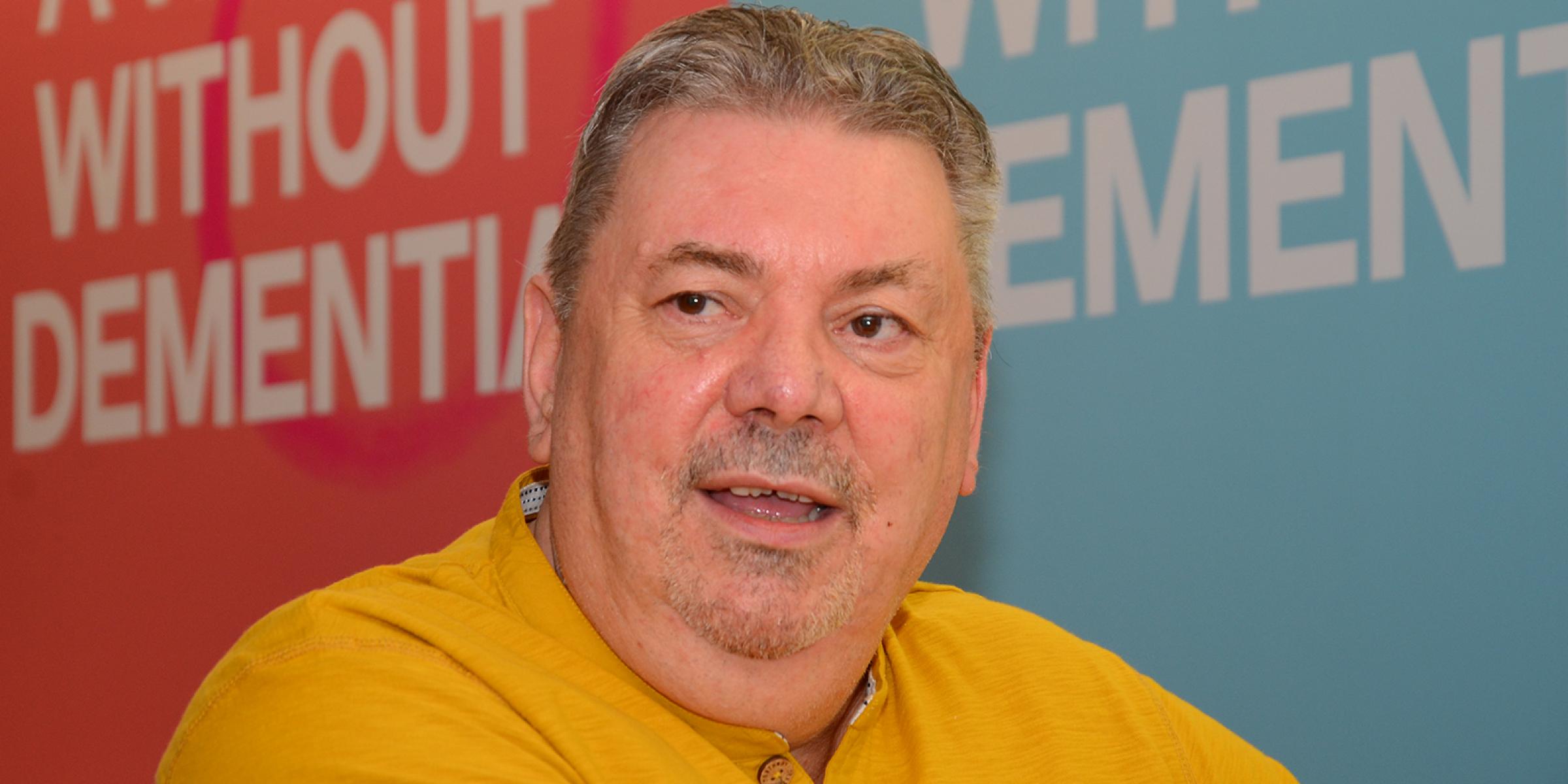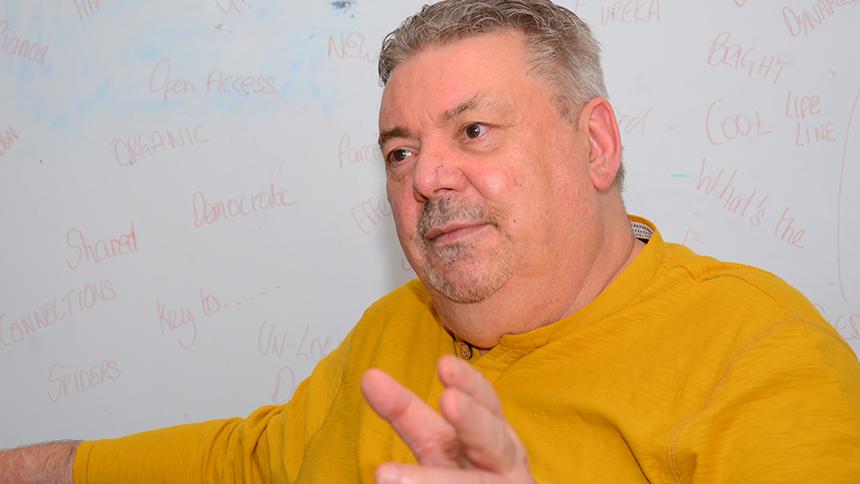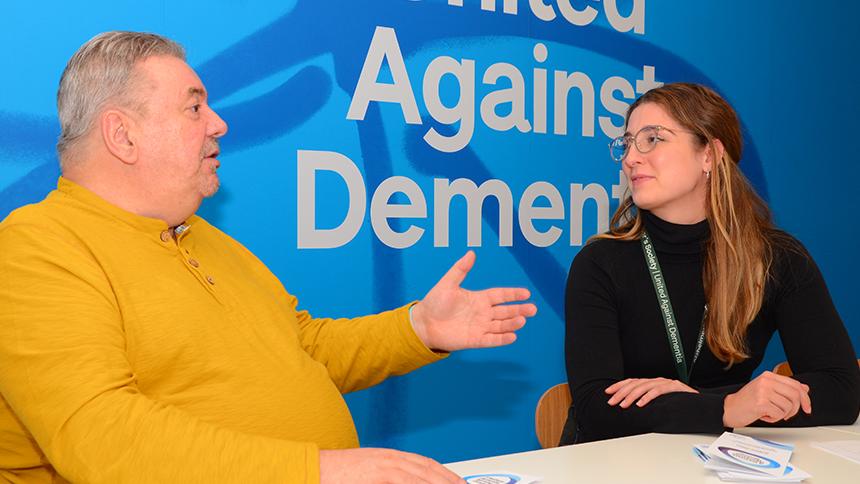
We are the storm: The power of a shared voice
Nigel Hullah, a former human rights lawyer who now has dementia, wants everyone affected by the condition to have their say.
Read this story in Welsh
‘I think the time has come to make a real political statement over dementia – to make MPs and ministers a little bit afraid of us,’ says Nigel Hullah, 65, who has been living with the condition for six years.
A former human rights lawyer from Cardiff, Nigel wants people affected by dementia to unite to demand change in how others see and support them.
Press the orange play button to hear this story in Nigel's own words:
Lost hours
Nigel, who now lives in Swansea, became aware he had a problem that needed to be addressed when he ‘lost’ hours from his day. He was working for a charity at the time, in a role that involved early morning starts.
‘I’d put the news on at 5.30am and the next thing I knew it was quarter to six, quarter to seven. Then it was four in the afternoon and I’d have no recollection of that time loss,’ he says.
Following a ‘tortuous four years of pre-diagnostic rigmarole’, Nigel was diagnosed aged 59 with posterior cortical atrophy (PCA), a rarer form of dementia, in 2012.
‘I now have to factor in an extra hour, in case I wake up and something’s gone missing from my mind again,’ he says.
‘I look at the coffee machine and think, “How does that work?” Or I look at my shoes and wonder how my laces work. No two days are exactly the same.’
Lesser person
Nigel found his diagnosis ‘truly shocking’, but was more disturbed by how society now viewed and treated him.
‘Everybody saw me through the prism of dementia – I stopped being a person,’ he says.
‘I felt my human rights had been taken away from me. Banks, statutory bodies and justice departments all felt I was a lesser person because of the presence of dementia. That made me quite angry.’
‘Everybody saw me through the prism of dementia – I stopped being a person,’ says Nigel.
Nigel, who lives alone, says this caused him to ‘sink into some deep depression’.
‘My day consisted of getting up in the morning, and drinking and eating until I fell asleep. I ordered my food online. My weight ballooned to 30 stone and I was totally immobile. I dropped off from friends and family, and became socially isolated.’
He credits his turnaround to occupational therapists from the local young-onset dementia team.
‘Had that carried on, I suspect I wouldn’t be here now. But they turned up at my door and ‘‘attacked’’ me with all the vigour and fervour of a religious crusade,’ he says.
‘They threw stuff out of my fridge and colluded with my friends, family and neighbours.
‘I think occupational therapists are the magic bullet – they build on what you have and enable you to do things.’

Nigel says if we don’t stand up for our rights, they will be diluted
Powerful voice
As Nigel’s understanding of his new situation came into focus, he grew increasingly angry at how people with dementia are treated.
‘For me, I think dementia is wholly a matter of human rights,’ he says.
‘On diagnosis, we are routinely placed with a community mental health team, even though there’s no presence of a mental illness. That’s human rights infraction number one.
‘Equity in healthcare, law, employment – they all disappear.’
He recalls having to get support from a voluntary agency on a tax issue, because HMRC staff wouldn’t deal with a person with dementia on their own.
‘It’s these slight, subtle changes,’ he says. ‘We’ve all got human rights and they shouldn’t dilute with age or evaporate in the face of frailty or disease. If we don’t use them, then they will be diluted.’
Nigel is also demanding better from those who oversee dementia care and support.
‘When service planners say that they’ll try to adopt a human rights model, that isn’t good enough,’ he says. ‘You’re expected to treat me exactly the same. You’re not doing me any favours – it’s the law.’
Nigel feels that people affected by dementia have yet to realise the power of their own voices in demanding that their rights be recognised and respected.
‘If there’s 850,000 people in the UK with dementia, and for each of them there’s 10 other friends or family affected by it, that’s 8.5 million people,’ he says. ‘Imagine if you politicised them, gave them a voice.
‘We could go to lawmakers and service planners and say, “I am part of the constituency of people with dementia – you will not use my condition to deny me my human rights.”’

Nigel meeting with Hannah Fitzgibbon, Project Support Officer, at our central office
Social movement
Nigel is adamant that people living with dementia should be at the centre of discussions about how services are provided.
He highlights the impact of people in Wales sharing their experiences of dementia with the Welsh government ahead of the country’s Dementia Action Plan.
‘In May 2016, the Welsh Cabinet Secretary for Health said that the voices of people with dementia had changed their minds about the services we’re going to provide,’ he says.
‘That action plan is a fantastic example of what happens when you involve the people who are going to be in receipt of these services.
‘Given the opportunity, we can get fired up, we can be ready to go. We can go to our lawmakers and say, “We don’t want what you think we want – this is what we want.”’
‘We want to bring to people’s attention things like the broken social care system,’ says Nigel.
Nigel is also part of the 3 Nations Dementia Working Group (3NDWG), a network of people living with dementia in Wales, Northern Ireland and England. They aim to use their personal experiences to become the ‘go to’ group for anyone seeking input from people with the condition.
‘We’re pushing social change to the forefront of our agenda. I want the dementia world to be a social movement,’ he says.
‘We want to bring to people’s attention things like the broken social care system, a benefits system that isn’t fit for purpose, and the lack of opportunities for people with dementia to utilise transport, education and healthcare.
‘We’re the steering group and we want to have thousands of associate members, so that when we get things going we have that strength of voice to really make an impact.’
Everyone involved
Nigel has been involved with DEEP, the Dementia Engagement and Empowerment Project, which brings together groups of people with dementia from across the UK to influence the services and policies that affect them. He also sits on a number of advisory groups and shares his experiences at events and conferences.
But he says that none of this would be possible without the backing of his friends at Fuse and Muse, the peer support group he attends in Swansea.
‘Sometimes dementia whispers in my ear, “Nigel, you ain’t strong enough to withstand the storm.” But one phone call, conversation or meeting with my group and I’m able to say to dementia, “I am the storm.”
‘There is no support like peer support – it has saved my life.’
As he plays his part in rallying the growing dementia movement, Nigel wants to ensure that no one is left behind.
‘I want everyone to have a say, everybody to have a view,’ he says. ‘I want everybody to feel valued and wanted – that’s the key. Nobody should feel marginalised or abandoned.
‘We’re all important. We’ve all got something to offer.’
--
Update 06/12/18: This article was updated to correct some dates and ages.


Carol Borroff
saysI am pleased that Nigel is managing to get his situation sorted out to help him live better. But!. 'There is no one size fits all' with dementia. For a start, there are so many different kinds of dementia that affect different parts of the brain. When my husband was diagnosed 11 years ago he never asked what was wrong with him, he never questioned anything. He never asked why he was seeing a doctor or going to a cognitive therapy group once a week. He just did whatever I did without question. Shopping, dentist, day out visiting family. Never questioned anything. It was only years later that he started getting angry and upset because he could no longer do things for himself. If he had been on his own from the beginning he would probably eventually have wandered and got lost. My husband is in a nursing home now. He is settled in his own world and thank goodness not angry or tormented anymore. I wish you luck Nigel and hope you get all the support you want and need.
Bob davis
saysI should add that I worked under Nigel at a Cardiff hospital where he was a charge nurse. I was 19. He was then early 20s. I am now 63. So your article understates his age by about10 years. Regards, Bob.
Hi Bob, thanks for letting us know. We've made some checks and updated the article with the correct age. Thanks again, and sorry for the confusion!
- Magazine team (Alzheimer's Society)
Bob davis
saysHullah's not 57. At least 10 years older.